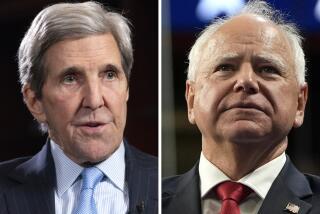Clark Declaring Bid for President
WASHINGTON â Retired Army Gen. Wesley Clark, who led NATOâs campaign to oust Serbian strongman Slobodan Milosevic, will announce his candidacy for president today in his hometown of Little Rock, Ark., political associates said Tuesday.
Clark has been signaling for weeks that he would become the 10th candidate in the Democratic race, and he left little doubt about his plans in comments Tuesday. âI believe Iâm the most qualified man to stand for election, represent this party, in this election of 2004,â he said on CNN. âAnd I believe Iâm the most qualified man to become the next president of the United States -- man or woman.â
He added: âWeâre going to have a vision that helps transform this country to meet the challenges of the 21st century. And I believe I can lead that.â
His candidacy would add another unpredictable element to a Democratic race that already has been marked by the surprise surge of former Vermont Gov. Howard Dean, whose campaignâs aggressive use of the Internet helped him galvanize Democrats opposed to the war in Iraq.
Clark, 58, has never run for office, and political analysts say that looms as both his biggest asset and greatest vulnerability.
âDemocrats are so hungry for change, for somebody to speak up for them,â said Democratic consultant Donna Brazile, who ran Al Goreâs 2000 presidential campaign. âDeanâs impressive campaign has shown that you must give voice to those who want to see a change in our priorities.
âIf Gen. Clark can suck up that oxygen,â she said, he should fare well in the race.
Clark benefits because heâs ânot one of the other nine,â said Philip Klinkner, associate professor of government at Hamilton College in Clinton, N.Y.
But Stuart Rothenberg, an independent political analyst, expressed skepticism about Clarkâs prospects. Referring to his frequent appearances on cable network news shows as a military analyst, Rothenberg said of Clark: âI think itâs just very different from when youâre whizzing onto CNN to do some commentary ... versus if youâre really under the scrutiny of the national media.â
Clark also starts late in the process -- and behind in two assets that are keys to successful presidential campaigns: money and political organization. But his backers express confidence that Clark can quickly become financially competitive and put together an effective campaign team.
âThereâs been an outpouring of support over the last couple of weeks,â said Mark Fabiani, a former Gore staffer who flew to Little Rock for Clarkâs expected announcement. âItâs an unusual year. Maybe itâs an excellent time for this kind of candidacy.â
Clarkâs major selling point is his 33-year military record: first in his class at West Point, a veteran of Vietnam who was wounded in action, and NATO commander during the 1999 conflict in Kosovo. Clark supporters say that background would enable him to neutralize President Bushâs credentials as a wartime president, the issue Democrats fear could be the most crucial to voters.
It also would give Clark greater latitude and credibility than the other Democrats in attacking the administrationâs foreign policy, his backers say.
Leading up to the war in Iraq, Clark advocated giving the United Nations more time to determine whether Saddam Husseinâs regime was hiding weapons of mass destruction. After Husseinâs government was quickly toppled, he praised the militaryâs performance but criticized the administration for going it alone and for not preparing better for the peace.
In the short term, Clarkâs candidacy could stall Deanâs momentum and hinder the other top-tier candidates, if for no other reason than by stealing the media spotlight. On Tuesday, for instance, news of his expected candidacy overshadowed the rally that Sen. John Edwards held in his home state of North Carolina to officially launch his campaign.
Clarkâs campaign also could force other candidates to change strategic gears. Sen. John F. Kerry (D-Mass.) highlights his background as a Vietnam War hero and foreign policy expert. Now, said Patrick Basham, senior fellow at the libertarian Cato Institute think tank, âheâs out-soldiered by Clark.â Sen. Joe Lieberman (D-Conn.) has hoped to appeal to more moderate voters in the South with his pro-war stance. Now, says Basham, Lieberman may no longer be âthe most attractive candidate for those receptive to a moderate record.â
But Clark is largely an unknown figure who, as a candidate, must soon detail his views on a host of domestic issues that are of vital importance to core Democratic constituencies.
According to the DraftWesleyClark.com Web site, started in April by self-described political independents in hopes of propelling Clark into the race, he favors abortion rights and supports the principle of affirmative action. He also backs a review of the USA Patriot Act, the domestic anti-terrorism measure enacted after the Sept. 11 attacks, to assess its effectiveness and potential damage to individual rights.
But Klinkner noted: âNo one really knows him, and to the extent they know anything about him, itâs a rather idealized picture and one that is bound to be tarnished by increased public scrutiny of his record and positions.â
For a few days, maybe a week, Rothenberg predicted, voters will be treated to âa Wesley Clark media frenzyâ -- unless Hurricane Isabel dominates the news. But he said he doubts Clark has âthe personal skills to withstand the fishbowl of a presidential candidate.â
Brazile, however, said she believes the skills he has polished as a media figure will serve Clark well on the campaign trail and enable him to connect with voters.
Rothenberg agreed that Clark âhas some pizazz, some charisma. He projects qualities of leadership and strength.â
As part of its effort to prod Clark into the race, the DraftWesleyClark campaign already has run ads in New Hampshire comparing Clark to Dwight D. Eisenhower, another general whose first political office was the presidency. The draft movement, which has leased offices in Washington and elsewhere, boasts pledges of nearly $1.5 million, and the services of tens of thousands of volunteers it says are ready to join the campaign.
Clarkâs schedule calls for him to appear Friday in Iowa, the site of crucial caucuses on Jan. 19.
Clark was born Wesley Kanne, the only child of Veneta and Benjamin Kanne. His father, a prosecutor in Chicago, was a Jewish veteran of World War I who died when Wesley was 5 years old. His widow moved to Little Rock, where she raised Wesley as a Southern Baptist. When she married Victor Clark, he adopted the boy.
Clark converted to Catholicism and has said he was unaware of his Jewish relatives until he was in his early 20s. He now maintains contact with his biological fatherâs side of the family. Clark and his wife, Gertrude, have been married for 36 years. Their son, also named Wesley, is a screenwriter in Los An- geles.
A 1966 graduate of West Point, Clark attended Oxford as a Rhodes scholar and was a White House Fellow in the Ford administration. Promoted to major at 31, he was the first member of his West Point class to command a battalion. In Vietnam, he was in charge of three companies, including an infantry group.
In 1997, Clark was named to lead NATO and U.S. forces in Europe. Amid reports of âethnic cleansingâ of Muslims by Serbs, he led the fight for extensive use of air power to drive Milosevic from power.
The Pentagon relieved him of duty a few months ahead of schedule. But Clinton administration officials, including national security advisor Samuel R. âSandyâ Berger, insist he was not fired.
âWes did a great job in Kosovo and deserves a great deal of credit for our victory there,â Berger said.
At the time, several U.S. military officers and others said friction between Clark and Pentagon leaders led to his abrupt departure.
More to Read
Get the L.A. Times Politics newsletter
Deeply reported insights into legislation, politics and policy from Sacramento, Washington and beyond. In your inbox three times per week.
You may occasionally receive promotional content from the Los Angeles Times.











